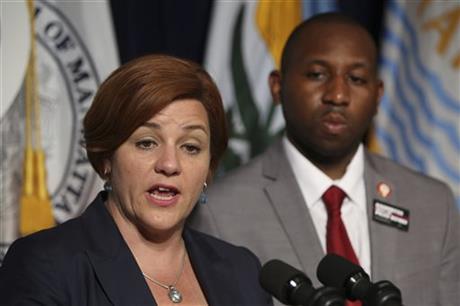
By JENNIFER PELTZ
New York City council speaker Christine Quinn is joined by councilman Donovan Richards as she speaks to reporters, Thursday, Aug. 22, 2013 in New York. New York City council members say they will make history with a vote to override Mayor Michael Bloomberg’s vetoes on police oversight bills. At a rally on Thursday before the vote, activists cheered and held signs that read “override.” (AP Photo/Mary Altaffer)
NEW YORK (AP) — New York police have been given two layers of oversight in two weeks that are intended to balance the force’s culture of aggressive crime prevention tactics with the civil liberties of the New Yorkers they’ve sworn to protect.
Propelled by concern about the NYPD’s use of its stop and frisk tactic and its extensive surveillance of Muslims, the City Council overrode mayoral vetoes Thursday to create a watchdog for the police department and make it easier for people to file profiling lawsuits against it.
The measures mark the most aggressive legislative effort in years to put new checks on the police department, and the vote came less than two weeks after a federal judge imposed new oversight of her own.
“Today marks a monumental civil rights victory for New Yorkers,” Councilmen Jumaane Williams and Brad Lander, the legislation’s sponsors, said in a statement.
Their proposal drew national attention from civil rights groups and a vehement response from Mayor Michael Bloomberg, who slapped it down earlier this summer. He said Thursday it will make it “harder for our police officers to protect New Yorkers and continue to drive down crime.”
The city is also appealing the ruling from U.S. District Court Judge Shira Scheindlin, who appointed an outside monitor this month to overhaul stop and frisk, a practice she said the police department used in a way that violated the rights of hundreds of thousands of black and Hispanic men. Police have stopped, questioned and sometimes patted down about 5 million people over the past decade.
Supporters say the new laws, coupled with the judge’s ruling, will end practices they see as unfair, will mold a more trusted, effective police force and can change how other departments use the policy.
“What happens in New York city has consequences for the nation,” National Association for the Advancement of Colored People head Benjamin Jealous said at a City Hall rally before the vote.
Opponents said the measures would lower police morale but not crime, waste money and not solve a broader problem of a police force under pressure after shrinking by thousands of officers during the last decade.
“These bills are downright dangerous,” Councilman Eric Ulrich said.
Bloomberg and police Commissioner Raymond Kelly said the police force has driven crime down to record lows without racially profiling. They say that between the council measures and the court ruling, police will be tangled up in second-guessing and lawsuits.
“It will have an adverse impact not only on our police officers but more importantly on the people and the neighborhoods they serve, particularly in minority communities,” Kelly said in a statement.
Levele Pointer, 46, who has himself been stopped, said sometimes he felt police accosted him just because of where he was or how he looked, but other times, police explained their reasoning in a way that made sense, even if he had done nothing wrong. And he hopes the new laws will foster more understanding between officers and residents.
“Now we have some legislation in place that will allow us to do the things we need to do so we can have community policing,” said Pointer, who attended Thursday’s Council vote.
The inspector general will have subpoena power to examine the NYPD’s operations and policies. The other measure gives people more latitude to sue if they feel police targeted them because of their race, sexual orientation or certain other factors. The lawsuits could seek policy changes but not money.
Some other police departments, including Los Angeles’, also have had both court monitoring and an inspector general. New York police were also under a 1980s federal decree regarding undercover and surveillance techniques, but this level of outside scrutiny is unprecedented for the agency.
Associated Press writer Colleen Long contributed to this report.



